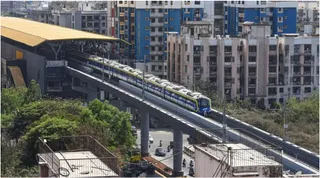- By Deeksha Gour
- Tue, 26 Aug 2025 11:41 PM (IST)
- Source:JND
Mumbai Metro Line 4 Update: Mumbai Metro Line 4 will soon operate with 39 fully driverless trainsets, French transport giant Alstom announced on Tuesday. Each trainset will have six coaches, adding up to 234 metro cars. The company confirmed that these trains will be built in India, combining technology, safety and passenger comfort.
Mumbai Metro Live 4 Driverless Train: Manufacturing Across Indian Cities
The metro cars will be manufactured at Alstom’s facility in Sri City, Andhra Pradesh. The engineering and design will come from the Bengaluru centre, while the propulsion systems will be produced in Coimbatore, Tamil Nadu. Bogies for the trains will be made at the company’s plant in Savli, Gujarat.
Advanced Signalling With CBTC
Along with the trains, Alstom will also provide a Communications-Based Train Control (CBTC) signalling system. This technology will enable driverless operations and improve the reliability and safety of services across the 35.3-km-long corridor. The deal also includes five years of maintenance.
Alstom And L&T Partnership
The project is being executed under a contract awarded by the Mumbai Metropolitan Region Development Authority (MMRDA) to Larsen & Toubro (L&T). L&T has partnered with Alstom to deliver the integrated package of rolling stock and signalling solutions.
Ling Fang, President of Alstom’s Asia-Pacific region, said the company was “honoured to be chosen for the prestigious Mumbai Metro Line 4 project,” adding that Alstom’s trains and signalling systems already serve other metro lines in Mumbai.
Metro Line 4: Key Corridor For Mumbai
Metro Line 4 will run 35.3 km between Wadala and Kasarvadavali in Thane, making it one of Mumbai’s longest corridors. The line will have 32 stations and will connect with the Eastern Express Highway, Monorail and other metro lines. Once operational, it is expected to significantly improve east–west and north–south connectivity across the city.

